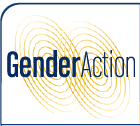|
Thank you for investing in Gender Action. Your gift will impact many lives and help us fulfill our mission to ensure women's rights and gender equality are promoted in international investments.
The many ways you can help further Gender Action's mission:
Support Gender Action
 Make a tax-deductible donation through Network for Good
If you have any difficulty with these donations, please contact elainez@genderaction.org.
If you are interested in sending a check, please make it out
to Gender Action and mail it to the following address:
Gender Action
925 H St NW
SUITE 410
Washington DC 20001-4978, USA
Contributions made by US residents to Gender Action, a 501(c)3
non-profit organization, are tax-deductible.
Holidays 2023
Dear Gender Action Supporters and Would-be Supporters,
To protect and improve women and girls' lives, Gender Action tries to ensure taxpayer-supported development bank projects keep their promises to do so.
This year, for example, we are helping Cambodian small loan borrowers, mostly women, who in order to repay predatory loans are forced to sell their land, become migrants and push their children into work. The borrowers were unaware that their banks used deceptive lending practices.
Behind this predatory lending is the World Bank Group's (WBG's) private sector arm - its highly profitable International Finance Corporation (IFC) -- which boasts that its micro, small and medium enterprise (MSME) projects uplift poor people's lives, especially women's. Because the IFC loans to Cambodia (and other countries) are made indirectly through "financial intermediaries" such as commercial banks, the IFC fails to conduct required project due diligence. Thirteen IFC MSME projects are implicated in lending to over 167,000 indebted poor Cambodians, who are intimidated and coerced to repay debts that originate at the IFC. These abusive loans breach the IFC's mandatory environmental and social policies.
To obtain remedy, the Cambodian victims filed a complaint with the IFC's "independent" accountability mechanism, which reports directly to the WBG Board. However, IFC management improperly blocked the complaint from being addressed. Gender Action and partner watchdog groups revived the complaint process by appealing directly to the WBG Board of Directors. We await a hopefully positive response.
The Cambodian case is not the only notorious IFC project Gender Action is challenging this year. The Bridge International Academies scandal takes the cake:
This year media reports exposed that the IFC ignored multiple incidents of child sexual abuse committed over several years by teachers at the IFC's $13.5 million Bridge project in Nairobi, Kenya. IFC staff failed to monitor the project even after learning that teachers were abusing young girls.
When Nairobi community members complained to the IFC accountability mechanism, IFC and Bridge managers signed a non-disclosure agreement that violates the IFC Access to Information Policy and infringes on the accountability mechanism's "independent" mandate. IFC retaliated against the accountability mechanism by dismissing its respected director. Gender Action and partner watchdog groups are pushing the WBG Board to require the IFC to provide the abused girls with financial
compensation, counseling, health care, community reintegration, and legal support. We expect our demands will be met.
Both the Cambodian and Kenyan cases exemplify how Gender Action advocates for gender justice for women and girls harmed by public development bank projects.
Gender Action also continuously pressures the development banks to stop investing in fossil fuels. This year Gender Action got the WBG's new draft gender strategy to remove language promoting fossil fuels. The strategy's promotion of fossil fuels contradicts the WBG's overall commitment to transition out of fossil fuel financing. This faux pas reflects how the WBG's siloed gender and climate practices fail to communicate.
Stopping development banks from promoting fossil fuels is important because fossil fuels undermine everyone's but especially women's well-being -- since women in developing countries depend on climate change-affected agriculture and natural resources for household food, water and fuel. Investing in fossil fuels also undermines our planet's existence. For these reasons we strongly call for development banks to cease all fossil fuel activities.
A significant Gender Action accomplishment this year, based on seven years of persistent advocacy, was obtaining a first ever gender policy and hiring the first ever gender expert at the Asian Infrastructure Investment Bank (AIIB). At the same time, Gender Action continuously pressures the AIIB, that invests in projects across the developing world, to end fossil fuel investments.
With women and girls composing the majority of developing country poor, Gender Action is pushing development banks to intersectionally address gender inequality and climate change.
Achieving gender and climate justice takes all of us.
Please contribute to our important work by clicking https://www.genderaction.org/donate.html or mailing a check to Gender Action, 925 H Street NW, Suite 410, Washington DC 20001.
Thanks so much for your support and very Happy Holidays!
Warm regards,

Elaine Zuckerman
President
|
